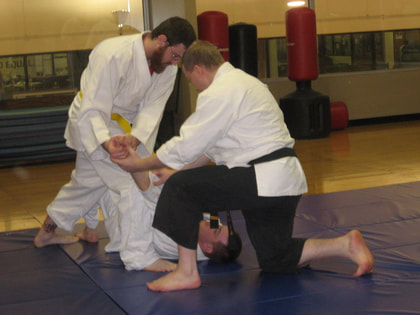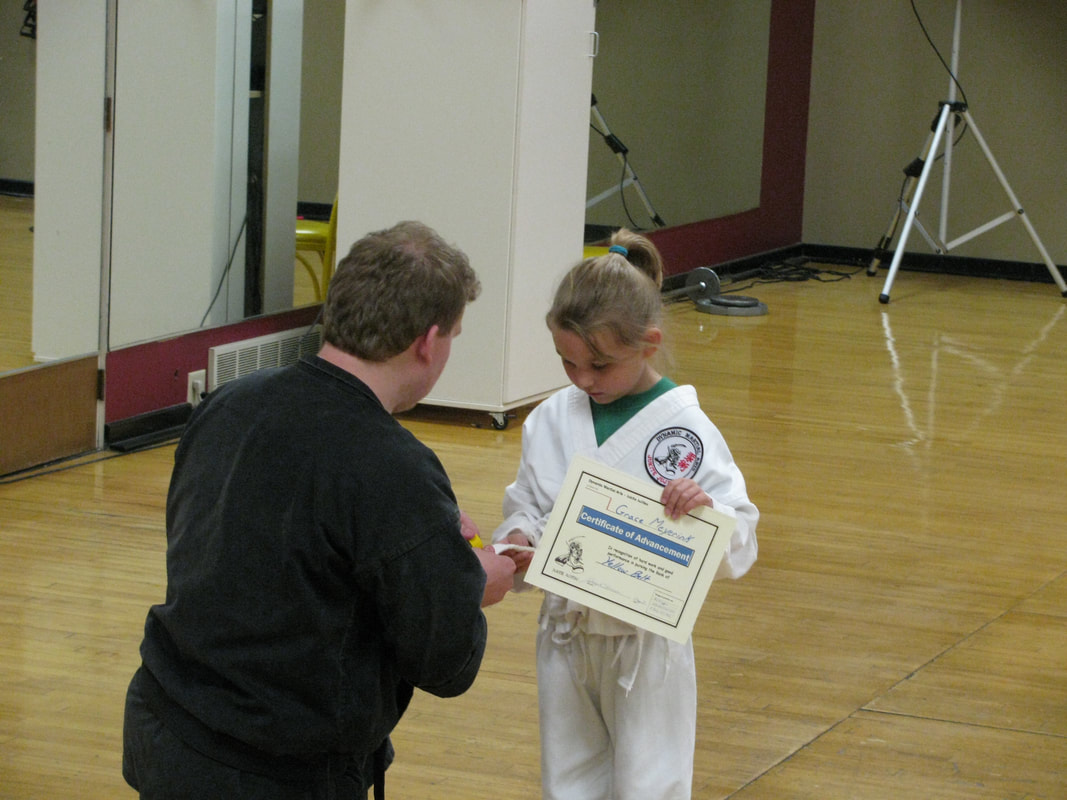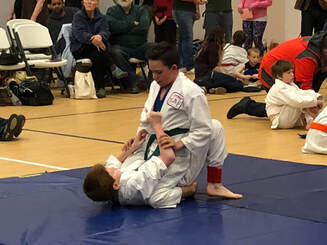|
1. Arrive on Time -
Please try to arrive on time, or even a little early. Arriving late disturbs the class and is considered disrespectful. If you do have to be late or leave early, please inform the head instructor in advance if you can.
|
2. Bowing
The bow in Japan is a sign of respect and courtesy. A bow should be rendered by bending 45° from the waist, with your head up. Bows should be rendered in the following situations:
- Bow as you enter and leave the dojo, even if you are just there to watch. This signifies that you are there to learn something and you respect the people participating in the class sharing their knowledge with you.
- Bow as you step onto the mat. This is done to show that you are there to actively participate in class.
- Class will begin and end by formally bowing as a group to the shomen (the front of the room/flags) and to each other.
- Bow whenever you begin working with a new partner or when you are done working with your current partner. This is to thank them for working with you.
- Bow when you receive instruction from a person who outranks you. This is to thank them for sharing their knowledge with you.
|
3. Clothing
The complete uniform of a martial artist is called a dogi, or clothing of the way. (This term is often shortened to gi.) Much like any uniform, students are expected to follow certain guidelines concerning the wear and care of the uniform. For details of your art, please see your instructor or your training manual but here are some general guidelines.
|
4. Personal Conduct
A martial artist is a person of character and honor. That means that all students are expected to follow a strict code of conduct. Students should conduct themselves in an honorable, responsible, and respectful manner both in the dojo and during their day-to-day lives. Other expectations include:
- Students will refrain from making false, fraudulent, misleading or deceptive representation about their rank, ability, background or training.
- It is important and required that you accept your classmates solely for the purpose of learning martial arts and helping them to be proficient in all aspects of the art.
- Do not act in any manner or say anything to any other participant in your dojo that would be distracting and disruptive to the normal instructional pattern of the Sensei. The only justification for any type of disruption is if a student is in imminent danger of injury.
- It is forbidden to engage in/or support any practice which results in discrimination of any kind including but not limited to discrimination based on race, color, creed, age, sex, ancestry, national origin, veteran status, disability or sexual orientation.
- No student should demonstrate unsportsmanlike conduct during class or competition. Such conduct will result in suspension of class.
- Your personal conduct both inside and outside the dojo is a direct reflection of both you and your instructors. It is expected that your behavior upholds the values and morals of the dojo. Failure to do so may be grounds for your membership to be terminated.
- It is forbidden to use the art(s) we are teaching you in vein or for aggressive reasons at any time. If used in any means besides self-defense or competition purposes, the student will be immediately dismissed from class and dojo membership will be terminated.
5. Safety
One of the greatest concerns when participating in any activity involving physical contact is safety. Martial arts is no different. The techniques you will learn can inflict extensive damage if not performed with control. Please read the safety rules listed on the “safety rules” page and follow them carefully.
6. Sharing What You Have Learned
|
We would like to ask that you please refrain from sharing the information and techniques you learn in this class with others. If they would like to learn more about what you are doing, invite them to class where they may learn the information in a safe and controlled manner, with qualified instructors. Even if they do not want to participate, spectators are always welcome.
|
7. Self Defense
Please remember the art(s) you are learning is/are for self defense purposes only. Use of any of these martial arts in an aggressive manner is strictly prohibited, and is grounds for expulsion from the dojo. You are welcome to enter into sanctioned tournaments and similar activities with your instructor’s permission, but remember you are representing not only yourself, but also the entire Dynamic Martial Arts name. Please respect what so many have worked so hard to create.
8. Past Injuries
Students with past physical injuries are required to submit proof of health, signed by their parents (if under 18 years of age) and Physician before becoming a member of the dojo. The Chief Instructor reserves all right to cancel any membership if health reasons are endangering the student.
9. Discipline
Discipline is a right reserved only to the head Sensei of the dojo. You do not have the right to discipline any student in your Sensei’s dojo, without consent by your Sensei.
The most important thing to remember when you come to class is that we are all there to learn. We have all been at that point where we feel confused and intimidated by everything in class. Give it time, ask lots of questions, and never be afraid to try something new. Everyone in the dojo, from the youngest white belt, all the way up to Shihan Julio Usera is there to learn from you and share his or her knowledge with you. In time, the dojo will no longer be an intimidating place of mystery, but instead a welcome sanctuary against the daily stresses of life.


